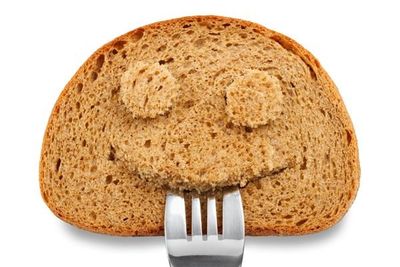Scientific research finds an association between diet and depression. Diets that included vegetables, fruit, meat fish and whole grains are associated with lower levels of depression and anxiety. Is it any wonder that foods and moods are related?
Is it possible to eat foods that put you in a better mood?
Before you answer that with a "duh, yes, that's what comfort foods are for," let me clarify.
Comfort foods, while they may be hearty and make you feel all nostalgic, cuddly and cared-for, are usually not the best foods to eat in terms of health. Think macaroni and cheese, mashed potatoes, biscuits and gravy and apple pie, and it doesn't take long to realize why. Along with consuming lots of carbs, starches and fats, chances are you're swallowing a side of guilt.
What's the point of trying to comfort yourself if the unintended outcome leads to stress and regret?
On the other hand, there are actually foods that been proven to have properties that can help you feel more relaxed and happier. In her book, Get Smart, registered dietitian Samantha Heller writes, "It is not unusual to see an improvement in mood … as a result of a better diet."
Surely foods and moods can make for a happy marriage.
What to eat: Fish
Why it can make you happy: Major depression is associated with lowered omega-3 fatty acid levels. Fish has a high concentration of these beneficial fatty acids. A study of depressed people who had not responded well to antidepressants showed that those who were given 1,000 milligrams of EPA—a type of omega-3 fatty acid—daily for three months showed significant improvements including better sleep and less anxiety.
Best Fish: Cold-water fish, like salmon, mackerel and sardines, have the highest levels of omega-3s. Other sources of omega-3s include ground flaxseeds, flaxseed oil, soy, tofu, canola oil, walnuts, walnut oil and seaweed.
What to eat: Dark green veggies
Why they can make you happy: Veggies like broccoli, Brussels sprouts, asparagus and spinach are loaded with folate, which is a B-complex vitamin that helps regulate mood. Many studies find that depressed people suffer from folate deficiency in their diets; this deficiency can deplete levels of the neurotransmitter serotonin, which helps regulate moods.
How much to eat: Consume at least five servings of fruits and veggies each day.
What to eat: Eggs and bacon
Why they can make you happy: Psychiatrist Drew Ramsey, author of The Happiness Diet, says that free-range eggs contain lots of vitamin B12, which is crucial for avoiding agitation and loss of focus. In addition, pasture-raised pigs contain oleic acid, which is linked to a decreased risk of depression in women. The choline in both eggs and bacon is linked to lower anxiety, he says.
What to eat: Beans
Why they can make you happy: For one thing, beans take a long time to digest, thus stabilizing blood sugar levels (low blood sugar can result in mood swings). For another, they contain folate and are rich in the amino acid tryptophan, which is used by the body to produce serotonin. If you're not used to eating beans, start slowly to avoid bloating and gas.
What to eat: Tomatoes
Why they can make you happy: Aside from being rich in lycopene, a nutrient that stops the buildup of pro-inflammatory brain compounds that are linked to depression, tomatoes also contain folic acid, which may help prevent an excess of homocysteine from forming in the body. Excess homocysteine can interfere with the production of serotonin, dopamine and norepinephrine, all mood regulators.
More food for thought:
Menopause and Anxiety
What Is Happiness?


